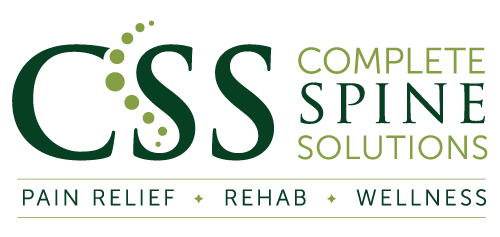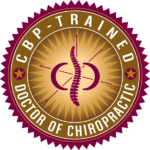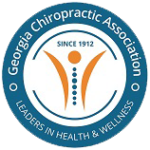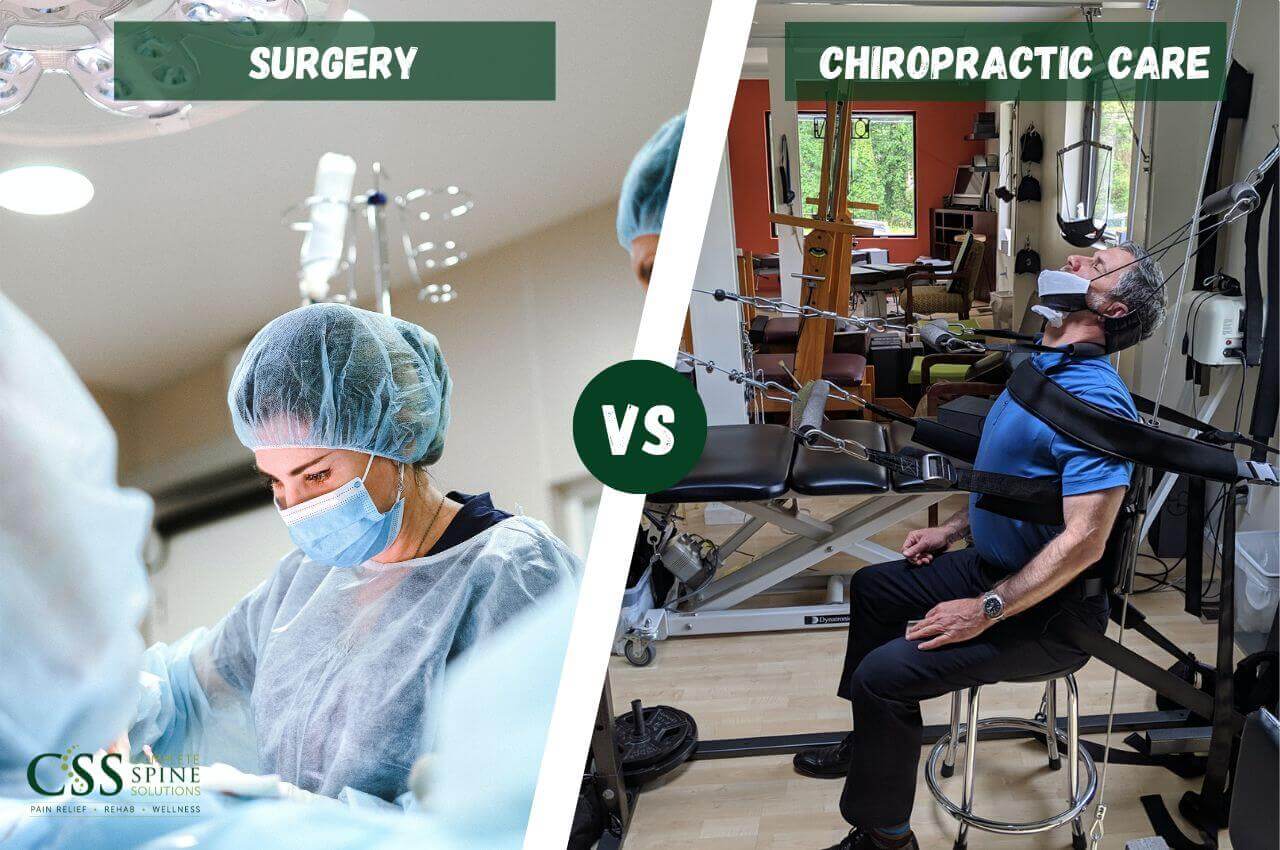
Did you know that 99 out of 100 surgeons said they would not elect to have lumbar fusion surgery if it were recommended to them, according to a poll during a conference in Bonita Springs, Florida?
Back pain is a prevalent issue affecting individuals of all ages, prompting consideration of various treatment options. When exploring solutions for chronic back pain, it’s crucial to understand the potential risks of back surgery, which is an invasive procedure. This article will explore why back surgery should be avoided and how chiropractic care for back pain is one of the best alternatives to back surgery.
What is Invasive Surgery on the Back?
An invasive back surgery is a surgical procedure that involves making incisions and physically entering the body to address spinal issues or conditions. These surgeries are considered invasive because they require the manipulation of tissues, bones, and sometimes the use of implants to correct problems within the spine. Invasive back surgeries are typically performed in an operating room under general anesthesia. There are two common types of back surgeries: laminectomy and spinal fusion.
What is a Laminectomy?
A laminectomy is a surgical procedure that involves the removal of a portion of the vertebral bone called the lamina. The lamina is the flat, arch-shaped bone at the back of each vertebra that forms a protective covering over the spinal cord. The removal of the lamina is typically done to relieve pressure on the spinal nerves or spinal cord, often caused by conditions such as spinal stenosis or herniated discs.
What is Spinal Fusion?
Spinal fusion is a surgical procedure that involves joining two or more vertebrae together to create a solid, single bone. This is often done to stabilize the spine and reduce pain caused by conditions such as degenerative disc disease, spinal deformities, or injuries. During the procedure, bone grafts, metal plates, screws, or rods may be used to promote the fusion of the vertebrae.
Chiropractic vs. Surgery: Understanding the Key Differences
Choosing between chiropractic care and surgery is a significant decision, and understanding the distinctions between the two options is essential. Making an informed choice can significantly impact your overall well-being and quality of life. Let’s examine a direct comparison of the two.
Philosophy of Treatment
Chiropractic Care focuses on the body’s innate ability to heal itself. Chiropractors believe that proper spinal alignment facilitates optimal nervous system function, allowing the body to recover naturally.
Surgery involves physical intervention, often with the goal of correcting anatomical issues. It is typically considered when other non-invasive methods have proven ineffective.
Invasiveness
Chiropractic Care is non-invasive and drug-free. Treatment involves manual adjustments, gentle instruments, exercises, and stretches to restore spinal alignment without the need for incisions or anesthesia.
Surgery uses invasive procedures that may require anesthesia, incisions, and the installation of hardware in the spine, such as rods and screws.
Effectiveness
Chiropractic Care is highly effective at relieving back pain by addressing the root cause through spinal adjustments. It aims to restore proper alignment, motion, and energy flow throughout the body.
Surgery success rates vary, and up to 40% of back surgeries may result in “failed back surgery syndrome.” Another reason to consider why back surgery should be avoided is the effectiveness may be limited, and the procedure may not guarantee relief from pain.
Risks
Chiropractic Care carries minimal risks, such as potential short-term muscle soreness. Adverse effects are generally rare, making it a safer option for most individuals.
Surgery has high risks, including infection, disability, permanent limited mobility, continued pain, the possibility of re-operation, nerve damage, and, in extreme cases, death.
Downtime and Recovery
Chiropractic Care has no downtime typically required. Patients can resume their daily activities immediately after an adjustment.
Surgery often involves a lengthy recovery period, requiring weeks of downtime, physical rehabilitation, and potential work time missed.
Improvement in Function
Chiropractic Care aims to improve overall body function by restoring proper spinal alignment, motion, and nervous system function.
Surgery may or may not improve function and can sometimes limit the body’s functionality long-term due to the hardware installed in the spine.
Cost
Chiropractic Care is generally more affordable. The number of treatments needed depends on individual circumstances.
Surgery is expensive, involving costs for the surgical procedure, hospital stay, physical rehabilitation, and potential lost work time.
Below is a table summarizing the key differences between chiropractic care and surgery, and why back surgery should be avoided.
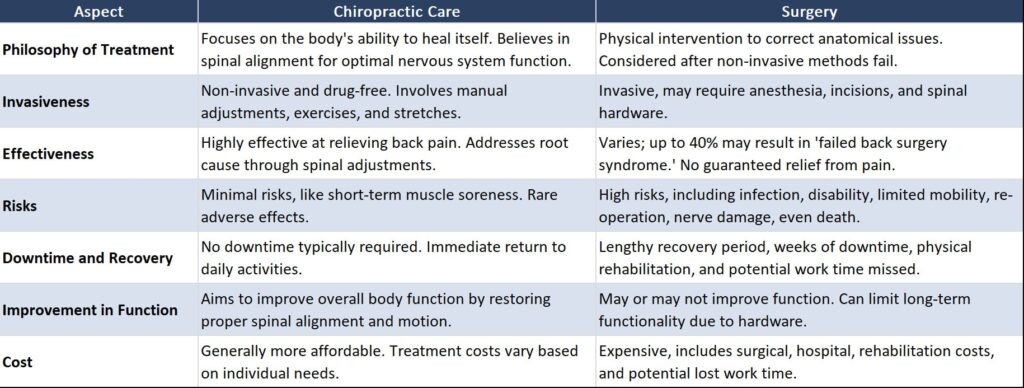
Preventative Care for Back Issues
We’ve discussed the differences in treating and managing back pain pretty in depth. However, apart from understanding why back surgery should be avoided, it’s also important to be aware of preventative measures you can take for back issues. Back pain can often be prevented or minimized by incorporating healthy habits into your daily life. At Complete Spine Solutions, we believe in empowering individuals with the knowledge and tools to proactively care for their spine. Consider the following preventative measures to promote a healthy back and reduce the risk of conditions that may lead to back surgery:
- Maintain a Healthy Weight: Excess weight can strain the spine and contribute to back pain. Adopting a balanced diet and regular exercise can help manage weight and support overall spine health.
- Regular Exercise: Engage in exercises that strengthen the core muscles, as they play a crucial role in supporting the spine. Activities such as walking, swimming, and yoga can contribute to better spine health.
- Maintaining Proper Posture: Whether at work or home, ensure your workspace is ergonomically friendly. Use chairs that support the natural curve of your spine and take breaks to stretch during long periods of sitting.
- Mindful Lifting Techniques: Practice proper lifting techniques by bending at the knees, keeping the object close to your body, and avoiding twisting movements. This helps prevent unnecessary strain on the back.
- Quit Smoking: Smoking can impair blood flow to the spine, leading to faster degeneration of spinal discs. Quitting smoking contributes to better overall spine health.
By adopting these preventative measures, you can take a proactive approach to maintain a healthy spine and reduce the likelihood of back pain that may require invasive interventions.
Chiropractic for Effective Back Pain Treatment
At Complete Spine Solutions in Tucker, GA, our mission is to be THE SOURCE for optimal health and healing, revolutionizing healthcare by empowering humanity, restoring hope, and unlocking the body’s innate potential to fulfill your life’s purpose. This mission extends beyond simply helping you feel better; it is deeply rooted in the belief that true health and healing can be achieved without resorting to invasive measures like back surgery.
We understand that back pain can be debilitating, affecting not only your physical well-being but also your overall quality of life. Our commitment to your well-being starts with an extensive examination. Unlike the risks associated with back surgery, we embrace the latest, most effective non-invasive treatments to relieve pain and improve your overall health.
Make an informed choice for your health and well-being by exploring the non-invasive back surgery alternatives provided by our experienced team. Let us guide you on a journey toward optimal health and a fulfilling life without the need for invasive back surgery. Schedule an appointment today.
Frequently Asked Questions About Why Back Surgery Should Be Avoided
What to Expect After a Chiropractor Visit
Some individuals may experience mild soreness or fatigue after sessions, which is usually temporary. Serious side effects are rare.
How to Prepare for a Chiropractic Session
Wear comfortable and loose-fitting clothing. It’s often recommended to avoid clothing with belts or zippers. If you have relevant medical records or imaging results, it can be helpful for the chiropractor to review them. However, it’s not always necessary for the first visit.
Is Back Surgery Dangerous?
Back surgery, like any surgical procedure, comes with inherent risks. The level of risk can vary depending on the type of surgery and the individual’s health. Potential dangers include infection, nerve damage, complications from anesthesia, and the risk of failed back surgery syndrome, where the procedure does not provide the expected relief, leading to persistent or recurrent pain.
What is Spinal Decompression and How Does It Compare to Surgery?
Spinal decompression is a non-surgical approach aimed at relieving pressure on the spinal discs and nerves. It involves gently stretching the spine to create space between vertebrae, promoting the movement of herniated or bulging discs back into place. This method can reduce pain and improve function without the risks associated with surgery, making it a safer alternative for many individuals.
In comparison to surgery, spinal decompression is non-invasive, has minimal downtime, and carries fewer risks. It focuses on addressing the root cause of pain without the need for surgical incisions or hardware installation.
Is Back Surgery Worth It?
The decision of whether back surgery is worth it depends on various factors, including the specific condition, the severity of symptoms, and the individual’s overall health. While surgery may be necessary in certain cases, it is generally considered a last resort due to its nature and potential risks.
Non-invasive alternatives, such as chiropractic care and spinal decompression, are often explored first to provide relief without the associated dangers and lengthy recovery periods. It’s essential to weigh the potential benefits against the risks and explore all other options before opting for surgery.
If you’d like more tips on back pain and why back surgery should be avoided, check out our other articles on this site. If you continue to struggle with back pain or have more specific questions, give us a call at Complete Spin Solutions (770) 938-4606 or schedule an appointment online. Contact us today or stop by the office; we’re located at 2347 Brockett Rd Tucker, GA 30084, across from Fresenius Kidney Care Tucker and North Atlanta Primary Care Tucker, and northwest of the Tucker Town Square Center shopping mall.
About the Author

Dr. David Shapiro, DC, CEO of Complete Spine Solutions
A graduate of Life University, School of Chiropractic 1993 (4600 postgraduate hours). Board certified licensed Doctor of Chiropractic. Passed 3 national board tests and the state of Georgia board examination. Also certified in therapeutic modalities.
Advanced Certified in Chiropractic BioPhysics, the most evidence-based technique in chiropractic. He’s been in private practice for over 25 years.
